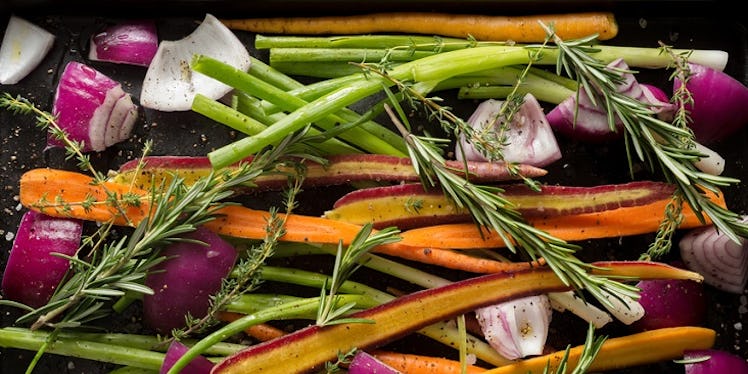
5 Unexpected Benefits Of A Vegetarian Diet Your Body And The Planet Can Enjoy
To celebrate a family member's high school graduation, my cousin hosted a barbecue that included a pig roasting.
If you're unfamiliar with the process, it takes hours for a pig to cook completely, and you have to keep a sharp eye on the flames.
Around mid-afternoon, my uncle, a retired fireman chief, yelled "Fire!" Everyone's head spun around to the five huddled grills, specifically that of the pig.
The entire animal had gone up in smoke, and all that remained were burned remnants of an innocent life that died to be eaten, yet never was.
There were groans of disappointment, sighs of, "Well, so much for that."
I couldn't help thinking how unfortunate it is that humans can feel such an emotional disconnect toward animals, never pausing to consider a helpless life had been lost for literally no reason at all.
This experience has led me to experiment with a transition from full-on omnivore to a part-time herbivore, not only so I can help prevent needless and grotesque deaths of innocent animals, but also because, to put it simply, it makes my body feel good.
Here are five benefits of vegetarianism that prove it's really not just a diet, but rather a lifestyle that pays homage to both the environment and your body.
1. Stop Animal Cruelty
Regardless of whether you consider yourself an animal lover or not, most people would agree that killing an innocent life for mere consumption is cruel, at least from a moral standpoint.
There are countless documentaries out there that go into gruesome, but ultimately truthful detail on what exactly goes on behind closed doors at factory farms, where animals become food.
The bottom line is, there's simply no moral way to kill a living creature that does not want to die.
2. Less Pollution
Taking a step back from what factory farms are actually doing to animals, these institutions are also undoubtedly harmful for the environment.
According to PETA, piles of animal waste product end up in lakes, rivers, drinking water, and on crops, while harmful chemicals and bacteria ruthlessly pollute the air.
3. Prevent Diseases
According to Harvard Health Publications, vegetarians “consume less saturated fat and cholesterol and more vitamins C and E, dietary fiber, folic acid, potassium, magnesium, and phytochemicals (plant chemicals), such as carotenoids and flavonoids” in comparison to meat-eaters.
Vegetarians thus get to enjoy the benefits of lower cholesterol, blood pressure, and body mass index -- three huge factors that can contribute to heart disease, cancer, and Type 2 diabetes.
4. Easier Digestion
Because meat is essentially just dense animal muscle, eating a ton of it can be brutal on your digestive system.
One of the reasons I choose to eat a predominantly plant-based diet is because my body can't break down animal product that easily, which results in some serious stomach pain and constipation.
Plus, vegetable-based diets are naturally high in fiber, which always helps to keep your bowels in check.
Of course, this isn't the case for everybody (and, more important, every body), but it may be something to ask your doctor about if you're currently experiencing stomach issues as a frequent meat-eater.
5. Customization
There are so many vegetarian variations to consider when you're trying to find one that best suits your lifestyle.
You might choose to go all-out and try a vegan diet, in which you wouldn't eat meat, poultry, fish, or any products derived from animals, which would also include eggs, dairy products, and gelatin.
You could even try out pescetarianism for a slightly smoother transition, which would involve no meat or poultry, but you can still eat fish according to this diet.
Whatever change you ultimately choose to make, be sure you're making the switch so you can eat what serves your body, not someone else's.